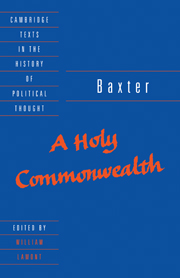Book contents
- Frontmatter
- Contents
- Preface
- Introduction
- Richard Baxter: a chronology
- Further reading
- Biographical notes
- A Holy Commonwealth
- Preface
- An Addition to the Preface
- Adam Contzen the Jesuites Directions
- 1 There is a God that is mans Creator
- 2 God is the Soveraign Ruler of Mankind
- 3 Of the Constitution of Gods Kingdome
- 4 Of the Administration of the Universal Kingdom
- 5 Of a subordinate Commonwealth in General
- 6 Of the several sorts of Commonwealths
- 7 Of the Foundation efficient and conveying causes of Power
- 8 Of the best form of Government, and Happyest Common-wealth
- 9 How a Commonwealth may be reduced to this Theocratical temper, if it have advantages, and the Rulers and People are willing
- 10 Of the Soveraigns Power over the Pastors of the Church, and of the difference of their Offices
- 11 Of the Soveraigns Prerogatives, and Power of Governing by Laws and Judgement
- 12 Of due Obedience to Rulers, and of Resistance
- 13 Of the late Warres Meditations
- Appendix: Preface to The Life of Faith (1670)
- Index
- Title in the Series
3 - Of the Constitution of Gods Kingdome
Published online by Cambridge University Press: 05 June 2012
- Frontmatter
- Contents
- Preface
- Introduction
- Richard Baxter: a chronology
- Further reading
- Biographical notes
- A Holy Commonwealth
- Preface
- An Addition to the Preface
- Adam Contzen the Jesuites Directions
- 1 There is a God that is mans Creator
- 2 God is the Soveraign Ruler of Mankind
- 3 Of the Constitution of Gods Kingdome
- 4 Of the Administration of the Universal Kingdom
- 5 Of a subordinate Commonwealth in General
- 6 Of the several sorts of Commonwealths
- 7 Of the Foundation efficient and conveying causes of Power
- 8 Of the best form of Government, and Happyest Common-wealth
- 9 How a Commonwealth may be reduced to this Theocratical temper, if it have advantages, and the Rulers and People are willing
- 10 Of the Soveraigns Power over the Pastors of the Church, and of the difference of their Offices
- 11 Of the Soveraigns Prerogatives, and Power of Governing by Laws and Judgement
- 12 Of due Obedience to Rulers, and of Resistance
- 13 Of the late Warres Meditations
- Appendix: Preface to The Life of Faith (1670)
- Index
- Title in the Series
Summary
Thes. 24. The World then is a Kingdom whereof God is the King, and the form of the Government is Monarchia absoluta ex pleno Dominio jure Creationis, an absolute Monarchy from or with a plenary Dominion or propriety of persons and things, by the Title of Creation … [But one Thomas Anglus ex Albiis East-Saxonum, in English, Thomas White, a Papist, in his book about Purgatory, and his other Writings, would perswade us, that such notions as these are but Metaphorical, and the conceits of vulgar heads, when properly applyed to God, and that indeed they that are wiser, know that God governeth as an Engeneer, that is, by a Physicall Premotion only, as men govern Clocks and Watches, or the Pilate governeth a ship.] …
Thes. 25. The denial of the Soveraignty of God, and his Moral Government is the denial of Deity, Humanity, Religion, Morality and pollicy, most of which I shall manifest brieffly in these following Instances.
1. I have shewed already that it is a denying God to be God, because to be God, is to be the Governor of the world, at least in Title.
2. If God be not Governour, he is not just: For communicative Justice he cannot exercise on Creatures that are wholly his own. And distributive Justice he can have none, if he have not the Relation which Justice doth belong to. He that is not a Ruler, cannot be a just Ruler.
- Type
- Chapter
- Information
- Baxter: A Holy Commonwealth , pp. 56 - 61Publisher: Cambridge University PressPrint publication year: 1994



